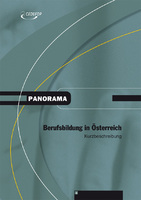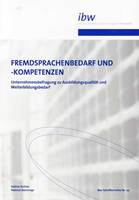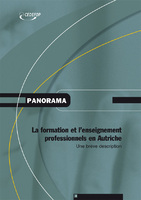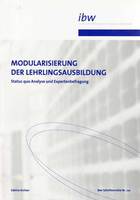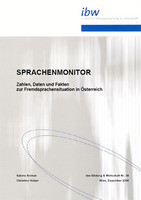Die vorliegende - im Rahmen der go international Initiative des Bundesministeriums für Wirtschaft und Arbeit (BMWA) und der Wirtschaftskammer Österreich (WKÖ) durchgeführte - Studie des Instituts für Bildungsforschung der Wirtschaft (ibw) zeigt die Ergebnisse einer österreichweiten und branchenübergreifenden Erhebung zum Fremdsprachenbedarf der Wirtschaft sowie die im Zuge dessen gewonnenen
Rückmeldungen zu Ausbildungsqualität und Weiterbildungsbedarf im Fremdsprachenbereich.
Die Ergebnisse dieser Befragung von mehr als 2.000 Unternehmen zeigen sowohl die starken internationalen Verflechtungen als auch den hohen (und zukünftig weiter wachsenden) Bedarf an Fremdsprachen (vor allem Englisch). Mehr als 80 % der Betriebe geben an, dass Englisch zumindest von einem Teil ihrer Mitarbeiter benötigt werde. Fremdsprachen werden dabei nicht mehr nur in der Führungsetage verlangt. Immerhin ein Drittel der befragten Unternehmen gibt an, dass auch die Fachkräfte in der Produktion fremdsprachenkompetent sein müssen. Die mündliche Kommunikation ist in der Regel bedeutend wichtiger als das Verfassen von Texten. In der Vermittlung von Sprechfertigkeit werden daher auch die größten Verbesserungspotentiale in der Aus- und Weiterbildung geortet.
The present study was carried out by the ibw (Institute for Research on Education and Economy) as part of the ‘go international’ initiative of the Federal Ministry for Economic Affairs and Labour (BMWA) and the Austrian Economic Chamber (WKÖ). It shows up the results of an intersectoral survey that was carried out in the whole of Austria. The survey assessed the economy’s need of foreign languages, and it gained
feedback on the quality of education and the demand for further training in the field of foreign languages.
The results of this study that included more than 2,000 companies, display strong international links as well as a significant need of foreign language skills (which is going to increase further) – first and foremost English. More than 80 percent of the enterprises claim that at least part of their staff have to master the English language. Foreign languages are not restricted to leading positions any more; one third of the companies
polled say that production staff too have to speak foreign languages. Hereby, speaking the foreign language is generally more important than its written form. Thus, the companies see a lot of potential for improvement in education and further training when it comes to teaching oral skills.
